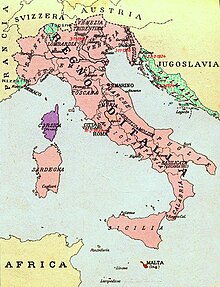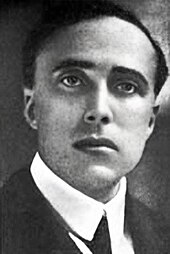March on Rome and early years in power
The March on Rome was a coup d'état by which Mussolini's National Fascist Party came to power in Italy and ousted Prime Minister Luigi Facta. The "march" took place in 1922 between 27–29 October. On 28 OctoberKing Victor Emmanuel III who according to the Statuto Albertino had both the executive and the Supreme military power, refused Facta's request to declare martial law, which led to Facta's resignation. The King then handed over power to Mussolini by inviting him to form a new government. Mussolini was supported by the military, the business class, and the liberal right-wing.
As Prime Minister, the first years of Mussolini's rule were characterized by a right-wing coalition government composed of Fascists, nationalists, liberals, and two Catholic clerics from the Popular Party. The Fascists made up a small minority in his original governments. Mussolini's domestic goal was the eventual establishment of atotalitarian state with himself as supreme leader (Il Duce) a message that was articulated by the Fascist newspaper Il Popolo, which was now edited by Mussolini's brother, Arnaldo. To that end, Mussolini obtained from the legislature dictatorial powers for one year (legal under the Italian constitution of the time). He favored the complete restoration of state authority, with the integration of the Fasci di Combattimento into the armed forces (the foundation in January 1923 of the Milizia Volontaria per la Sicurezza Nazionale) and the progressive identification of the party with the state. In political and social economy, he passed legislation that favored the wealthy industrial and agrarian classes (privatizations, liberalizations of rent laws and dismantlement of the unions).
In 1923, Mussolini sent Italian forces to invade Corfu during the Corfu Incident. In the end, the League of Nations proved powerless, and Greece was forced to comply with Italian demands. Writing of Mussolini's foreign policy, the American historian Gerhard Weinberg said:
"If the new regime Benito Mussolini installed in 1922 on the ruins of the old glorified war as a sign of vitality and repudiated pacifism as a form of decay, the lesson drawn from the terrible battles against Austria on the Isonzo river—in which the Italians fought far better than popular imagination often allows—was that the tremendous material and technical preparations needed for modern war were simply beyond the contemporary capacity of the country. This was almost certainly a correct perception, but, given the ideology of Fascism with its emphasis on the moral benefits of war, it did not lead to the conclusion that an Italy without a big stick had best speak very, very softly. On the contrary, the new regime drew the opposite conclusion. Noisy eloquence and rabid journalism might be substituted for serious preparations for war, a procedure that was harmless enough if no one took any of it seriously, but a certain road to disaster once some outside and Mussolini inside the country came to believe that the "eight million bayonets" of the Duce's imagination actually existed."
Acerbo Law
In June 1923, the government passed the Acerbo Law, which transformed Italy into a single national constituency. It also granted a two-thirds majority of the seats in Parliament to the party or group of parties that received at least 25% of the votes. This law applied in the elections of 6 April 1924. Thenational alliance, consisting of Fascists, most of the old Liberals and others, won 64% of the vote.
Squadristi violence
The assassination of the socialist deputy Giacomo Matteotti, who had requested that the elections be annulled because of the irregularities,provoked a momentary crisis in the Mussolini government. Mussolini ordered a cover-up, but witnesses saw the car that transported Matteotti's body parked outside Matteotti's residence, which linked Dumini to the murder.
Mussolini later confessed that a few resolute men could have altered public opinion and started a coup that would have swept fascism away. Dumini was imprisoned for two years. On his release Dumini allegedly told other people that Mussolini was responsible, for which he served further prison time.
The opposition parties responded weakly or were generally unresponsive. Many of the socialists, liberals, and moderates boycotted Parliament in the Aventine Secession, hoping to force Victor Emmanuel to dismiss Mussolini.
On 31 December 1924, MVSN consuls met with Mussolini and gave him an ultimatum—crush the opposition or they would do so without him. Fearing a revolt by his own militants, Mussolini decided to drop all trappings of democracy. On 3 January 1925, Mussolini made a truculent speech before the Chamber in which he took responsibility for squadristi violence (though he did not mention the assassination of Matteotti).
Building a dictatorship
Assassination attempts
Mussolini's influence in propaganda was such that he had little opposition to suppress. Nonetheless, he was "slightly wounded in the nose" when he was shot on 7 April 1926 by Violet Gibson, an Irish woman and daughter of Lord Ashbourne, who was subsequently deported after her arrest. On 31 October 1926, 15-year-old Anteo Zamboni attempted to shoot Mussolini in Bologna. Zamboni was lynched on the spot.Mussolini also survived a failed assassination attempt in Rome by anarchist Gino Lucetti, and a planned attempt by the Italian anarchist Michele Schirru, which ended with Schirru's capture and execution.
Police state
At various times after 1922, Mussolini personally took over the ministries of the interior, foreign affairs, colonies, corporations, defense, and public works. Sometimes he held as many as seven departments simultaneously, as well as the premiership. He was also head of the all-powerful Fascist Party and the armed local fascist militia, the MVSN or "Blackshirts", who terrorized incipient resistances in the cities and provinces. He would later form the OVRA, an institutionalized secret police that carried official state support. In this way he succeeded in keeping power in his own hands and preventing the emergence of any rival.
Between 1925 and 1927, Mussolini progressively dismantled virtually all constitutional and conventional restraints on his power, thereby building apolice state. A law passed on Christmas Eve 1925 changed Mussolini's formal title from "president of the Council of Ministers" to "head of the government" (though he was still called "Prime Minister" by most non-Italian outlets). He was no longer responsible to Parliament and could only be removed by the king. While the Italian constitution stated that ministers were only responsible to the sovereign, in practice it had become all but impossible to govern against the express will of Parliament. The Christmas Eve law ended this practice, and also made Mussolini the only person competent to determine the body's agenda. Local autonomy was abolished, and podestàs appointed by the Italian Senate replaced elected mayors and councils.
All other parties were outlawed following Zamboni's assassination attempt in 1926, though in practice Italy had been a one-party state since Mussolini's 1925 speech. In the same year, an electoral law abolished parliamentary elections. Instead, the Grand Council of Fascism selected a single list of candidates to be approved by plebiscite. The Grand Council had been created five years earlier as a party body but was "constitutionalized" and became the highest constitutional authority in the state. On paper, the Grand Council had the power to recommend Mussolini's removal from office, and was thus theoretically the only check on his power. However, only Mussolini could summon the Grand Council and determine its agenda. To gain control of the South, especially Sicily, he appointed Cesare Mori as a Prefect of the city of Palermo, with the charge of eradicating the Mafia at any price. In the telegram, Mussolini wrote to Mori:
- "Your Excellency has carte blanche; the authority of the State must absolutely, I repeat absolutely, be re-established in Sicily. If the laws still in force hinder you, this will be no problem, as we will draw up new laws."




